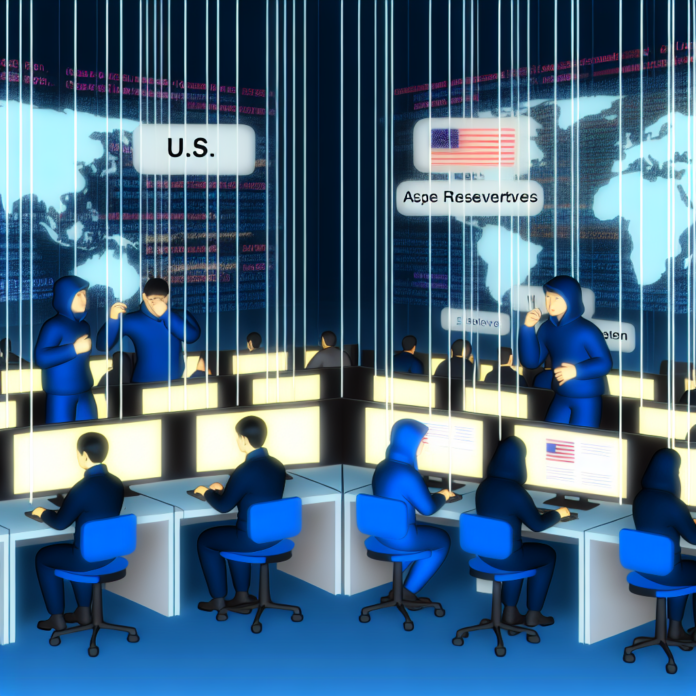Listen - Have this article read to you.(audio only click below)
A group of hackers associated with the Chinese government conducted a large-scale operation that targeted various individuals and organizations in the United States and the United Kingdom. This operation included U.S. officials, journalists, corporations, pro-democracy activists, and the U.K.’s election watchdog. American and British authorities announced a series of criminal charges and sanctions in response to this cyber attack.
According to officials, a campaign that started in 2010 aimed to intimidate opponents of the Chinese government, steal confidential information from American companies, and monitor prominent political figures. Western officials revealed the activities of a hacking group called APT31, raising concerns about China’s sophisticated spying abilities during an election year.
Seven hackers living in China were charged by the U.S. Justice Department. The British government also announced sanctions on a front company and two defendants linked to a breach that potentially allowed Chinese access to information on millions of U.K. voters stored by the Electoral Commission.
Attorney General Merrick Garland made it clear that the Justice Department will not stand for any attempts by the Chinese government to intimidate American public servants, suppress dissidents protected by US laws, or steal from American companies. He emphasized that this case highlights the lengths to which the Chinese government is willing to go in order to target and intimidate those who criticize them.
During the cyber-intrusion campaign, hackers sent over 10,000 emails worldwide posing as well-known journalists. These emails contained malicious code that, when opened, installed tracking software on the victims’ devices. This software provided the hackers with information such as the victims’ location, IP addresses, and the devices they used for email.
The hackers used the tracking information to focus on home routers and other devices, specifically targeting high-ranking U.S. government officials, politicians, and election campaign workers from both major political parties, according to the indictment.
The targets of the hacking included individuals working at the White House and various government agencies such as the Treasury and Commerce departments, as well as senators from different political parties. Also targeted were the spouse of a high-ranking official in the Justice Department, political advisors, and international political figures who were vocal critics of the Chinese government. This also included members of a pro-democracy organization.
The Justice Department announced that hackers started to target the email accounts of high-ranking members of a presidential campaign in May 2020, a few months prior to the general election.
Britain implemented sanctions after revealing in August that unauthorized individuals had accessed their servers between 2021 and 2022.
During that period, the oversight group mentioned that the data contained the names and addresses of individuals who had registered to vote. However, they noted that a large portion of this information was already publicly available.
On Monday, the Foreign Office stated that the breach of the election registers did not disrupt the electoral processes, did not impact individuals’ rights or access to the democratic process, and did not affect electoral registration.
According to British cybersecurity officials, APT31 hackers carried out reconnaissance against British lawmakers who were vocal about their criticism of Beijing in 2021. Fortunately, no parliamentary accounts were successfully breached.
On Monday, three politicians, one of them being former Conservative Party leader Iain Duncan Smith, disclosed that they have been experiencing harassment, impersonation, and attempted hacking from individuals in China. Smith shared an incident where hackers pretended to be him and used fake email addresses to communicate with his contacts.
APT31 has been accused in the past of focusing on U.S. presidential campaigns and the information systems of Finland’s parliament, along with other targets.
The Deputy Prime Minister of Britain, Oliver Dowden, announced that the government will be calling in China’s ambassador to discuss and address their actions.
The Ministry of Foreign Affairs in China stated that countries should support their claims with evidence instead of making baseless accusations against others.
The spokesperson for the ministry, Lin Jian, emphasized that cybersecurity concerns should not be turned into political issues. It is important for all involved parties to avoid spreading misinformation, act responsibly, and collaborate to uphold peace and security in the online space.
The Chinese embassy criticized the U.S. for reaching a baseless conclusion and making unfounded accusations against China without proper evidence.
The embassy expressed strong disapproval and stated that the information was misleading and inaccurate. China is firmly against this.
Rishi Sunak, the Prime Minister of Britain, stated again that China is showing more aggressive behavior in other countries and poses the biggest threat to our economic security as a nation.

